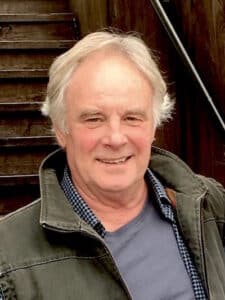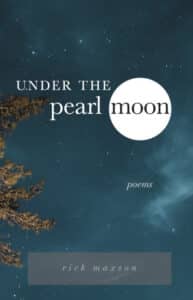Poet Rick Maxson’s debut collection Under the Pearl Moon has just released! We love Rick’s story and wanted to hear more of it. We think you’ll enjoy this further glimpse of the poet’s life and journey to find poetry.
Poet Rick Maxson Shares About Finding Poetry
Tweetspeak (TSP): Your bio says you got interested in poetry while you were in the thick of business. Can you say more about how this started and evolved?
Rick Maxson (RM): Around 1976 I was in college at Denison University. I liked reading poetry (though I found it difficult in many cases) so I took a poetry class. I was told by my professor that what I wrote lacked many qualities to be called poetry, and he threw my papers back at me. I began looking for “the best poets” so I could learn what was required. One day I picked up a volume by Wallace Stevens and began reading, but was very perplexed. So many of his poems made no sense to me, yet there was something about his poetry that mysteriously registered in my gut. “Puella Parvula” by Stevens made the hairs on my arms stand up, even though I found it strange. Then I read “Of Mere Being,” a short poem and one of his last. The final line of that poem is: The birds fire-fangled feathers dangle down. It not only touched me, the words seemed to reflect the action. If you read it aloud, you can hear its descending sounds. This was the first time I thought I was beginning to understand poetry.
Then someone gave me a large blank book that year for my birthday. I half filled it with horrible poems. It was later stolen when my house was robbed. From there I joined various poetry groups, trying to make people feel my words. It was frustrating, but I kept writing. Eventually, I found Tweetspeak Poetry after I had quit a group called The Cuisinart. Tweetspeak was what I had been searching for, a site that allowed me to post without extreme criticism but with gentle reminders, through its essays and photographs and also Glynn Young’s book reviews, of what constituted poetry. It made me happy to go there every day, even if I just read.
Tweetspeak was what I had been searching for, a site that allowed me to post without extreme criticism but with gentle reminders”
TSP: Is there any way in which being a business analyst or a technical writer prepared you to write poetry?
RM: Oh my yes! Technical writing exercises the imagination to a great degree. I’ve had to describe how a toy dump truck works, and how a water treatment plant does what it does. My favorite job as a technical writer was for three years with Home Shopping Network detailing the nuances of the supply chain, storage and retrieval system for its many studios, in Saint Petersburg, Florida, and the software workings that made the broadcasts fluid and attractive. It certainly made the job all the more enjoyable that the campus had a four-star-rated cafeteria.
At HSN I learned software diagrams, primarily Activity diagrams that described and demonstrated each minute stage of how a system worked. My wife, Carol, was a business analyst with the Veteran’s Administration at the time and we spent hours discussing the workings of software. She was instrumental in my learning. Overall, technical writing required interviewing and listening, most of all reflecting on what I saw and heard, much of the requirements for writing poetry.
Technical writing required interviewing and listening, most of all reflecting on what I saw and heard, much of the requirements for writing poetry.”
TSP: We get a fine list of the places you’ve lived, as we move from the beginning to the end of your wonderful poetry collection. But that’s not all, right? How many places have you lived? Can you share the full list? (We’re curious to know!)
RM: Besides what you discover in Under the Pearl Moon, I listed the primary places I lived, mostly the cities. Within those cities though I moved sometimes to many different areas for one reason or another: my income, divorce, landlords selling where I lived, me growing tired of an area. All in all I think I calculated once that I’d moved more or less fifty times in my life.
TSP: Tell us about a poet whose work you really admire. What do you love about it? (Sure, you can share a couple of favorite poetry quotes from their work!)
RM: That’s a tough one. There are so many poets I consider my teachers, some from years ago. Also, it’s worth noting that I find poetry in many stories and essays. Wallace Stevens remains a poet I turn to when I am lost. He gets me further lost and once I find my way out, I’ve learned something or feel better about wandering in the forest of poetry. Robert Frost, I think, has inspired many poets. In college I used to think he was just a country poet, writing about fences, woodpiles, snowy woods etc. One of my advisors at Denison, Tony Stoneburner, told me to read A Servant To Servants, and that turned my head around about Robert Frost.
So let me begin with Stevens, which is where in fact it began. Here are some lines from the powerful poem “Puella Parvula”:
Over all these the mighty imagination triumphs
Like a trumpet, and says in this season of memory,
When the leaves fall like things mournful of the past,
[… ] O mind
Gone wild, be what he tells you to be: Puella.
Write pax across the window pane. And then
Be still…
One of my favorite poems by Robert Frost is “Directive,” which seems appropriate when discussing revisiting one’s history. Here are some favorite lines:
The height of the adventure is the height
Of country where two village cultures faded
Into each other. Both of them are lost.
And if you’re lost enough to find yourself…
The playthings in the playhouse of the children.
Weep for what little things could make them glad.
Then for the house that is no more a house,
But only a belilaced cellar hole,
Now slowly closing like a dent in dough.
This was no playhouse but a house in earnest.
If I may go on to more current times, I have to talk about Laura Kasischke and then Jane Mead two poets I go to often. Kasischke has written several novels, three of which have been made into films, and eight books of poetry. The language in her poetry raises ordinary, even mundane, events into the realm of sacred and extraordinary. This poem from “Space In Chains”:
It’s all space, in chains—the chaos of birdsong after a rainstorm, the steam
rising off the asphalt, a small boy in boots opening the back door, stepping
out, and someone calling to him from the kitchen:
Sweetie, don’t be gone too long.
In her book Dance and Disappear, Kasischke’s poem “he Visibility of Spirits.” It begins:
Those ancients placed much confidence in the reality of the spirit world
by which they felt themselves surrounded. Man believed in an other-worldly
order of existence because from time to time he met its representative
in his own world. This morning
the breeze is so fresh it’s like a knife pulled
cleanly from the center
of a perfectly baked pie. The children
want pancakes for breakfast. The skillet
is ready, the Bisquick box says, when
a few drops of water sprinkled on it
dance and disappear.
Jane Mead came to me in her book The Lord and the General Din of the World. Mead has never written a poem I didn’t like. In her debut book above, my favorite poem is “Passing a Truck Full of Chickens at Night on Highway Eighty.” This poem recounts her feelings as she comes alongside a truck hauling chickens for market. I’ve seen such a truck in North Carolina and it is a terribly sad thing to encounter. Amid such a painful scene, there is one chicken in particular:
She had pushed her head through the space
between bars—to get a better view.
She had the look of a dog in the back
of a pickup, that eager look of a dog
who knows she’s being taken along.
She craned her neck.
She looked around, watched me, then
strained to see over the car—strained
to see what happened beyond.
That is the chicken I want to be.
Finally from across the Atlantic, where I go often for more insight, I have one of my favorites by Deryn Rees-Jones, “Making For Planet Alice”:
You stand on a chair with a wrinkled nose
In your glittery tiara. Queen Alice and her Queendom!
The room is full of ordinariness
And your laughter like a tossed coin
Spins into the air. Take me to that place, I say,
Where the trees grow upside-down and their thick bright roots
Explore the sky. Take me to that place
Over the backs of houses, past the forgotten railway…
Take me to that strange safe place, by bus, by unicycle
Helicopter, aeroplane. Let me sail to Planet Alice in my heart,
My leaky coracle; let me circumnavigate the moon,
The foam of snow-white stars. Take me to that strange place
That hurts me. That we both knew once upon a time.
Which I’ve not only lost, but forgotten how to say.
TSP: Did you ever think you’d be holding your own poetry collection in your hands? From your perspective, how does this reflect on life’s paths—both chosen and not?
RM: Let me just say, I’d hoped so. My life has been exhilarating, disappointing, arresting, adventuresome, and at times when I’ve reflected on it, I’ve felt it was wasted. I seem to have been so many different boys and men. Often what we choose is not what fate has chosen. As I wrote in a poem, Do Not Despair:
So walk.
There is only salty water behind you;
love may not come from what you love;
you cannot always choose
the door that opens your life.
I am so grateful now for how my life has turned out, for my marriage and for my wife’s (now mine) daughters, my friends at Tweetspeak, and my health that pushes me on. I believe we are going to move one more time to the North Carolina mountains, hopefully the last.
TSP: Where do you find your images and language for your poems? (They are quite intriguing.)
RM: Of course, reading images used by other poets, as mentioned in the excerpts above. I have a vivid imagination and find a lot of images and associations reflecting on dreams. Many images just come to me as I write. I do make use of dictionaries and thesauruses. I love to write, poetry and prose. It is fun.
TSP: Any advice for a would-be poet? (Especially if you think back on your own journey.)
RM: When I wrote bad poems, it was because I imitated so much, I drowned out my own voice inside me. I learned to first write how I feel, then nudge that into the realm of poetry. There is poetry everywhere. There is poetry in Moby Dick, To the Lighthouse, Lord of the Flies (of all places, right?). The challenge is to be open to it. Here is an example of finding poetry in the unlikeliest of places, on an island of stranded schoolboys reverting to their base instincts.
The Candlebuds
Now the sunlight had lifted
clear of the open space
and withdrawn from the sky.
Darkness poured out,
submerging the ways
between the trees
till they were dim and strange
as the bottom of the sea.
The candlebuds opened
their wide white flowers
glimmering under the light
that pricked down from the first stars.
Their scent spilled out into the air
and took possession of the island.
—a found poem from Lord of the Flies
Overall, I’d say to the aspiring poet, if you keep on trying to find good poetry, good poetry will find you—and begin to infuse your words.
Photo by Ruth Troughton, Creative Commons, via Unsplash.
Related
Poets and Poems: Rick Maxson and Under the Pearl Moon
- Braving the Poem: Interview with Catherine Abbey Hodges - March 24, 2025
- National Poetry Month Is Here + Prompt! - March 14, 2025
- Making & Unmaking Meaning: Interview with Wendy Wisner - March 3, 2025



Laurie Klein says
Rick, what a pleasure to be swept into the movement of a life—glimpses of your story, your hunger for words and sense of adventure and undaunted curiosity, the quotes, and insights.
Thank you!
Bethany R. says
Such a helpful and interesting interview, thank you for sharing this with us. Rick, I found your advice helpful and what you said about technical writing fascinating. And I love what you shared about your journey here. “From there I joined various poetry groups, trying to make people feel my words. It was frustrating, but I kept writing.” I can relate to this. “Eventually, I found Tweetspeak Poetry . . . [it] was what I had been searching for, a site that allowed me to post without extreme criticism but with gentle reminders . . .”
L.L. Barkat says
Loved this, Rick. Such a colorful life! 🙂 (And such a fabulous journey.)
Things I especially loved: that you let poetry wash over you without requiring yourself to understand it, that somehow *it* understood you, that you didn’t let the teacher’s criticism stall you but rather used it as a springboard; of course, the part about Tweetspeak… that is very, very dear.
And the part about you being so many boys and men. Somehow that really touched.